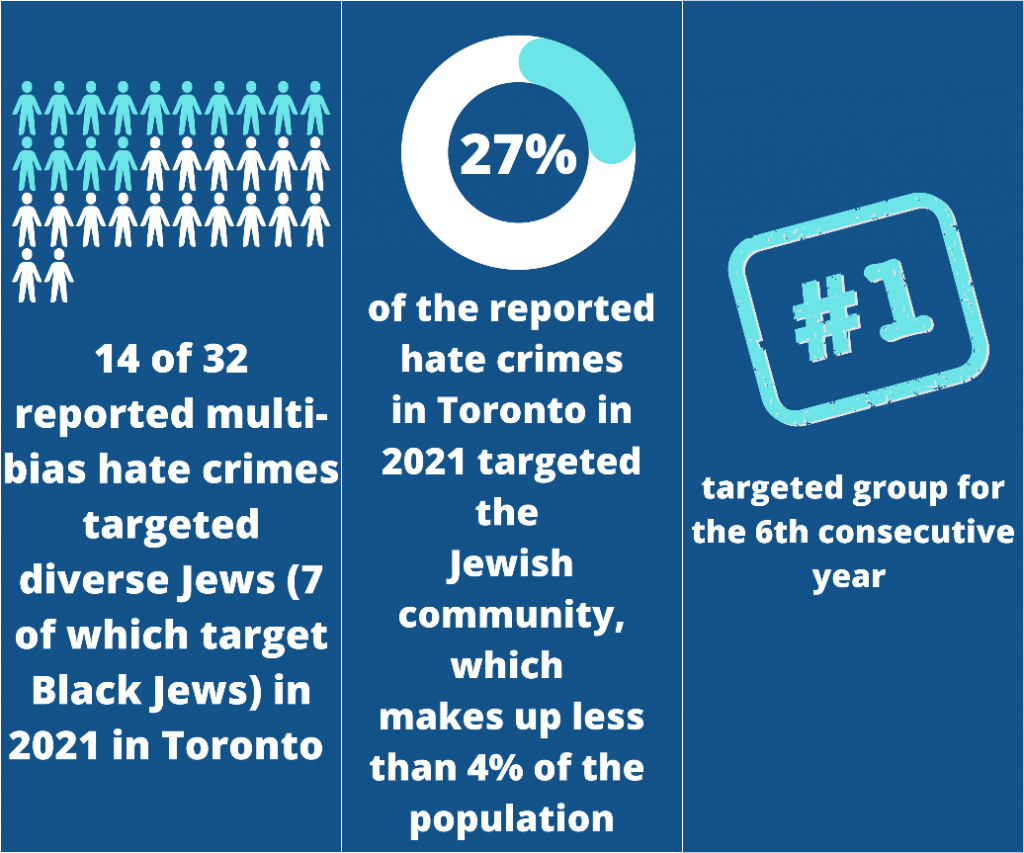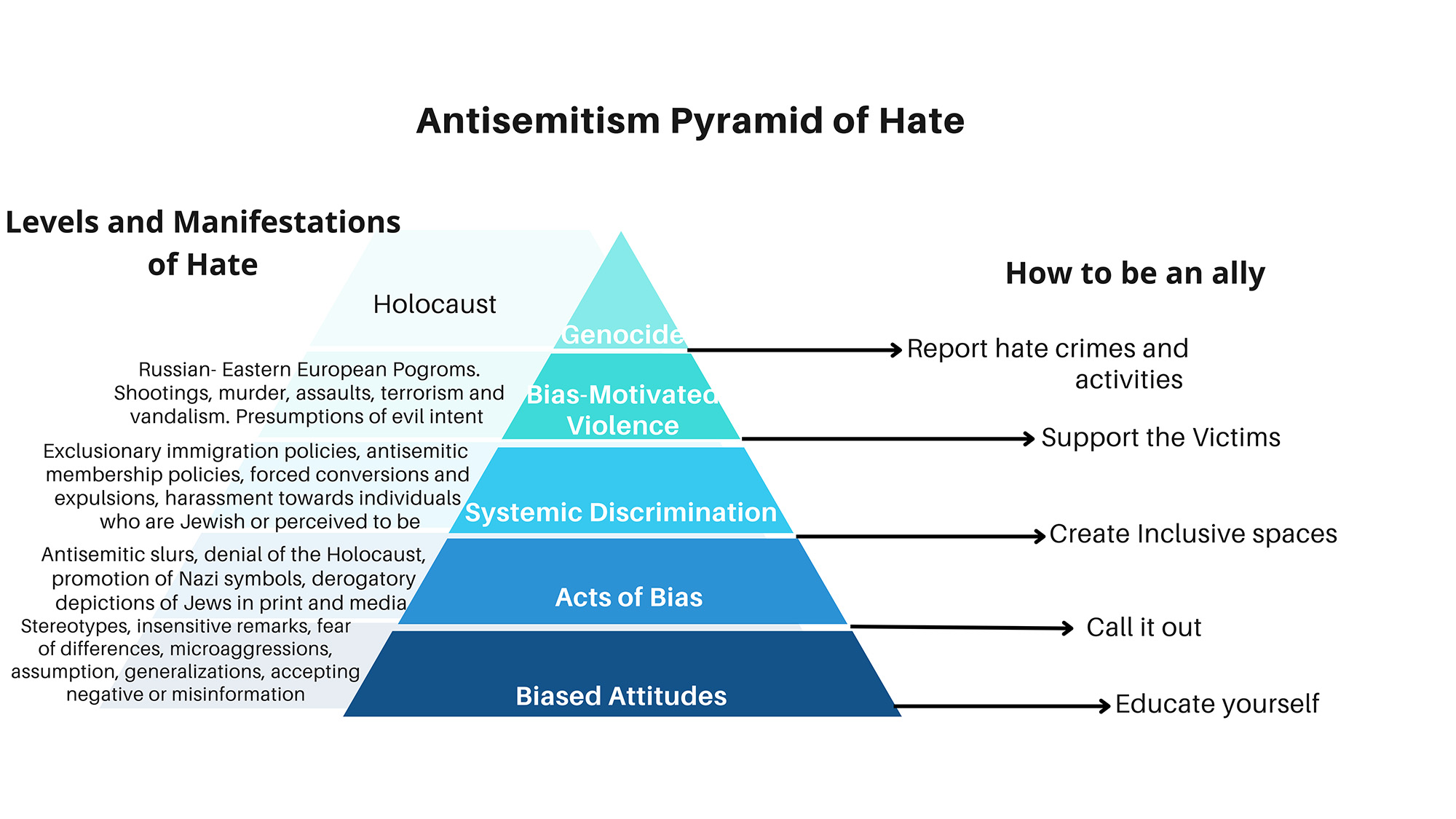Antisemitism is latent or overt hostility or hatred directed towards, or discrimination against individual Jewish people or Jewish people collectively for reasons connected to their religion, ethnicity, and their cultural, historical, intellectual and religious heritage. Jewish people have been persecuted for their identities regardless of their religious beliefs.
Antisemitism can take many forms, ranging from individual acts of discrimination, name-calling and bullying, online expressions of bias and hate, physical violence, vandalism in synagogues and Jewish cemeteries, assault and murder, to more organized and systematic efforts, including social, political and economic exclusion, and genocide, to destroy entire communities. This longstanding form of prejudice and discrimination continues in Ontario today.
Discriminatory harassment and bias against Jewish people, or those perceived to be Jewish, is often based on perceived attitudes about wealth and money, faith and religious practice, politics, or the way a person looks, dresses, speaks or behaves, and can include antisemitic jokes and micro-aggressions. Antisemitism is also expressed as scapegoating. For example, Jews have been blamed for large scale problems and societal challenges such as COVID-19 and economic crises.
Jewish people are diverse and represent every race, gender, political belief and economic status. For example, this includes racially and ethnically diverse communities, including Eastern and Western European and Russian (Ashkenazi), Middle Eastern, North African, Central Asian, and Balkan regions (Mizrahi), Ethiopian and Ugandan (African), and Spanish and Portuguese (Sephardi). As such, Jewish people can experience multiple forms of discrimination, harassment and bias.


The Pyramid of Hate shows biased behaviours, growing in complexity and severity from the bottom to the top of the pyramid. Although the behaviours at each level negatively impact individuals and groups, as one moves further up the pyramid, the behaviours have more serious – and even life-threatening – consequences. Like a pyramid, the upper levels are supported by the lower levels. If people or institutions treat behaviours on the lower levels as acceptable or “normal,” they become the foundation for the next levels and validate more serious negative conduct. The Pyramid of Hate demonstrates that hate-based violence and genocide arise from and are built upon the acceptance of biased attitudes and actions.
Examples of Manifestations of Hate
Biased Attitudes
- A central way that antisemitism thrives is through myths and stereotypes about Jewish people. These stereotypes benefit from a lack of clarity about who Jewish people actually are and ignorance about the demographics of the community.
- Today, pervasive stereotypes about the Jewish people relate to Jews controlling the media and financial institutions, and, more broadly, Jews conspiring to control the world.
- Even supposed “positive” stereotypes such as Jewish people being “doctors” and “lawyers”, or “good with money” are harmful.
Acts of Bias
- In early 2022, park signs in Markham, Ontario, and three high schools in Toronto were defaced with antisemitic graffiti.
- During the COVID-19 pandemic, some anti-vaccine protestors have equated public health mandates to Nazi rule and the experiences of Jews during the Holocaust; anti-vaccine protestors have been seen wearing yellow stars (with the word “unvaccinated” replacing “Jude” [“Jew” in German]) and waving Nazi flags.
- In 2020, an Ontario homeowner mowed a giant Swastika into the grass on their property.
- In 2017, during the Charlottesville, Virginia Unite the Right rally, protesters were seen chanting “Jews will not replace us.”
Systemic Discrimination
- Canada’s restrictive antisemitic immigration policies prevented Jewish refugees escaping Nazi oppression from coming to Canada. Between 1933 and 1948, less than 5,000 Jewish refugees were allowed into Canada – the smallest number of any Allied nation.
- Between the 1920s and 1960s, some universities in Canada implemented quotas on the number of Jewish students admitted.
- Until 1950, it was legal to prevent the sale of property to Jews and racialized people, including racialized Jews.
- Until the 1960s, there were sports and social clubs in Canada with policies prohibiting Jewish people from attending as guests or becoming members.
- In 2022, a school board in the USA banned the graphic novel “Maus” about the Holocaust.
- Studies have found that antisemitic content is widespread on social media platforms and only a small fraction of the posts that are reported and flagged are subsequently removed.
- In response to the prevalence of antisemitism, many Jews report having consciously downplayed their Jewishness in one or more situations such as in the workplace or when socializing with non-Jewish persons.
- Jewish holidays are often disregarded by workplaces, organizations and educational institutions when planning significant events and making demands – even when it violates their own policies.
Bias-Motivated Violence
- In 2022, a gunman entered the Congregation Beth Israel synagogue in Colleyville, Texas and took four people hostage.
- In 2018, an assailant entered Tree of Life – Or L’Simcha Congregation in Pittsburgh, Pennsylvania, and opened fire on people attending Passover services, killing 11 and injuring six.
- In 2015, an assailant entered a kosher supermarket in France, killed four people and took 15 others hostage.
Genocide
- Before World War II, approximately 9.5 million Jews lived in Europe. Between 1933 and 1945, the Nazis led a campaign of persecution and, ultimately, murder against the Jewish people. During the Holocaust, six million European Jews, including approximately 1.5 million children, were systemically murdered at the hands of the Nazis and their collaborators. Nearly two-thirds of the European Jewish population perished, and the population remains lower in 2020 than pre-World War II.
Examples of Allyship
Educate Yourself
- Increase your knowledge about antisemitism and uncover new ways to understand and identify antisemitic activities.
- Learn more about the diversity of the Jewish community and the history of antisemitism and the Holocaust.
- Learn more about how antisemitism is impacting Jewish people in our communities.
- Listen to diverse Jewish people’s experiences of antisemitism.
- Connect with local or national organizations that are fighting bias and hate.
Call it Out
- Speak up when you hear or see bias and hate.
- Challenge rumours, tropes, misinformation and lies.
- Report antisemitic posts on social media.
- Talk intentionally about how the fight against antisemitism is connected with the work of collective anti-oppression and human rights advocacy.
Create Inclusive Spaces
- Be proactive about being inclusive. Listen to and respect the perspectives and experiences of people who say antisemitism is happening.
- Act with collective responsibility, especially when you have social privilege. Act as an ally for other marginalized groups.
- Show strength and courage when facing hate and bigotry and ask for help whenever you need it (see internal resources below).
- Recognize Jewish holidays and observances and be mindful when scheduling events and meetings.
- Raise awareness on social media and in your workplace about International Holocaust Remembrance Day on January 27.
Support the Victims
- Victims of hate crimes are often alone and afraid. They have been attacked simply for being who they are. Silence amplifies their isolation; it also tacitly condones the act of hate. Victims need a strong, timely message that they are valued. Small acts of kindness can help.
- Reach out and support Jewish friends and colleagues after an act of antisemitic violence or hate. This will help foster a sense of community, lessen feelings of isolation and demonstrate that these actions and attitudes will not be tolerated.
Report Hate Crime and Activity
- Acts of hate are committed to intimidate, harm or terrify victims and the identifiable groups to which they belong. Victims of hate are targeted on the sole basis of who they are and/or the groups to which they belong.
- If you are subjected to, witness or aware of suspected hate crime:
- Keep all relevant material and records
- Record all information regarding the incident
- If you feel safe doing so, call the Police immediately! In an emergency call 911. Otherwise, call (416) 808-2222.
